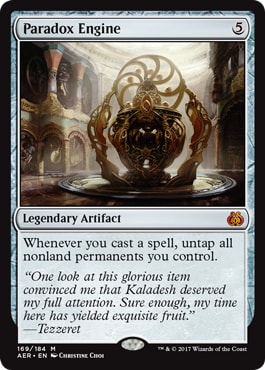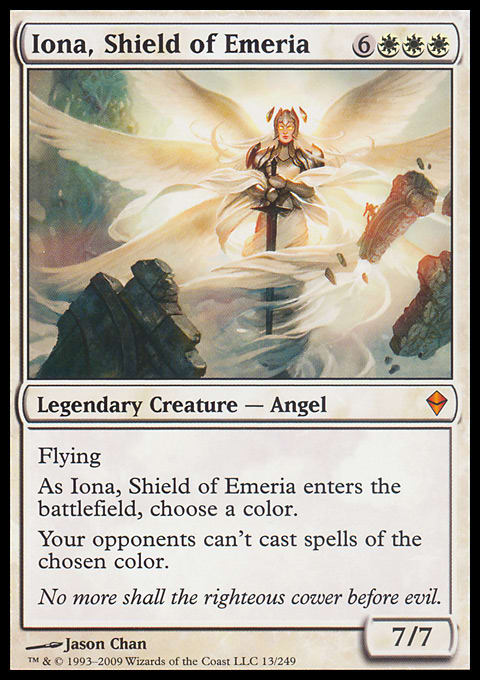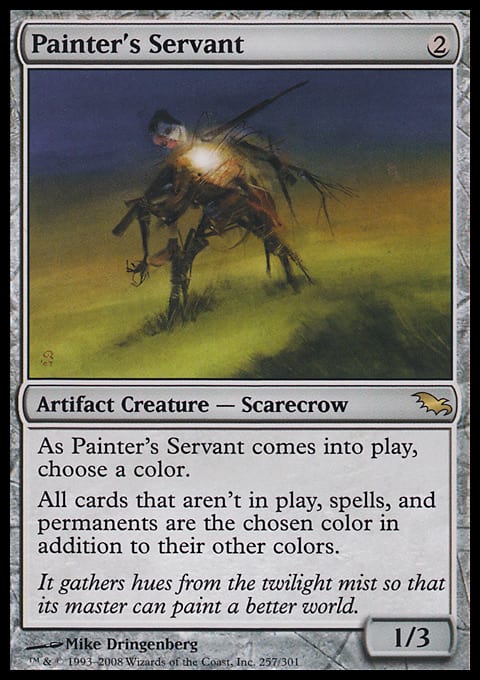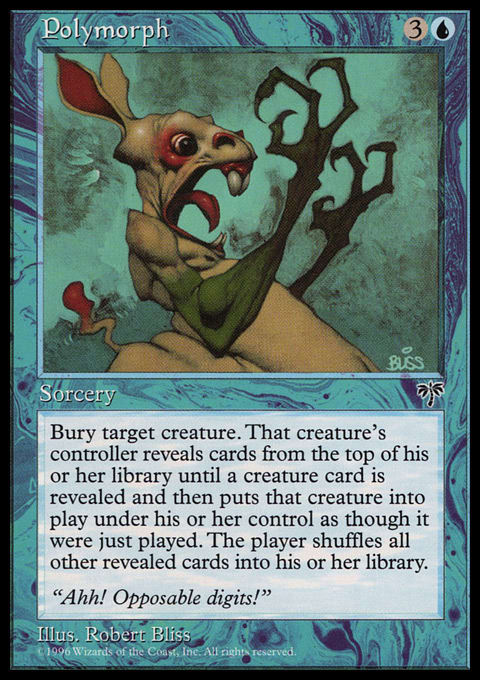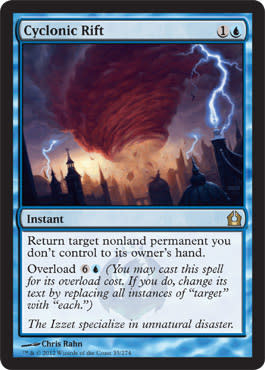Just last week, the Rules Committee for Commander updated the official Banned List for Commander, banning Paradox Engine and Iona, Shield of Emeria, while unbanning Painter's Servant. This unleashed a storm of discussion around these cards and other cards that people believe should be banned or unbanned. Then there are the groups who want to argue that the Rules Committee should be completely under the purview of Wizards of the Coast, which in turn brings out those who believe it should not change from the current structure.
I'm not going to share my opinion about any of that at this time; that's not what this article is about. I want to look at the banned list itself. What is it trying to do and what is it actually doing? Consider this paragraph from the Philosophy Statement from the Rules Committee:
Let's consider this from the point of view of one's local play group. Your local group is the group of friends you are playing with on a regular basis. For many of us, these are our friends who play Magic. My play group has existed for well over ten years. Almost everyone who was there at the start is gone now, but it continues to thrive and is my primary outlet for playing Magic.
I don't need the Rules Committee to determine what we should or shouldn't play in my group. We used the Banned List as a convenience. My group tends to lean on the Social Contract rather than the Banned List. There are some cards that we don't use simply because they aren't fun for others who play. Seeing the same powerful cards beat you up again and again just isn't all that exciting. Everyone understands that we are all there to have fun. If some of us aren't enjoying the games against a specific deck or a specific card, the card tends to disappear from our games. We don't need a long discussion, since the effect is rather obvious.
One of my older decks is a Polymorph deck. My friends grew tired of dealing with the deck, not because it is powerful, but because they have all seen it before. I haven't taken it apart yet, but I hardly play it now because I know they don't enjoy the interaction any more. This isn't a case of my group wanting to see a card get banned, but instead it is more like they just want a break from it.
With Paradox Engine and Iona, virtually nothing changes in our group. I think two of us ran a Paradox Engine in one of our decks, so we'll take it out and be done with it. We never used it in a way that was particularly broken, so no one complained. The Social Contract made everyone aware that Paradox Engine was only going to be fun for players for so long, and we had pretty much moved past using it long before the banning. Iona was another card that just seemed particularly mean to an individual player, so it has seen virtually no play in our group.
I believe most play groups are like this. Self-regulation happens constantly in groups. The Social Contract suggests everyone is policing themselves in small groups. We want everyone in the group to enjoy playing Magic with us, so we limit our decks to the strength of the group. Many of us do this without thinking about it, while others are more conscious about it. The joy is that every group tends to limit different cards or decks at different power levels. It is all about what works for your group.
Even the Rules Committee agrees with this. They may not refer to it specifically as the Social Contract, but it is right there:
We encourage groups to use the rules and the ban list as a baseline to optimize their own experience. This is not license for an individual to force their vision onto a play group, but encouragement for players to discuss their goals and how the rules might be adjusted to suit those goals.
Given all of this, it is easy to question the reason for a Banned List at all! If each group is self-regulating and using the Social Contract, why have a banned list?
The Banned List is for Commander games outside your play group. Much of the power of the Social Contract comes from your desire to play more games of Commander, so this isn't as effective outside of your play group. Inside your play group it is important that everyone enjoy the games. These are your friends and you want them to enjoy themselves. If you are doing something that is eliminating or reducing that level of joy, you are inclined to change what you are doing. That is the carrot portion of the Social Contract. The stick portion is that refusing to change can mean that eventually no one will play with you. Since these are your friends, they are probably more likely to just tell you they aren't going to play against a particular deck any more, but in a play group, these conversations are pretty easy to have, and often, they don't even need to happen. We recognize the "vibe" in the room and make the adjustment without anyone having to ask.
Outside your play group is a different story. It used to be that the social contract was still strong enough to discourage players from playing decks that others didn't enjoy. There was a time when there weren't that many Commander players. The scarcity of opponents meant that if people didn't like your deck, they stopped playing against you. This meant that if you kept playing annoying decks at your local game store, players just stopped wanting to play against you. You had to change. That is no longer the case. There are so many Commander players, that someone with an annoying deck can sit down and play a few games of Commander with some strangers. If the other players aren't having fun, the guy with the annoying deck who refuses to change gets cut off from that group. However it doesn't matter, since he just gets up and goes to the next group. The Social Contract works, in part, because of the scarcity of players. When there is no scarcity, the Social Contract breaks down.
This is where the Banned List comes in. The Rules Committee takes cards that reduce interaction and limit players' opportunities to do interesting things with their decks, and bans them. This reduces the number of decks that are miserable to play against. This reduces the odds of playing against decks that aren't fun for everyone.
The difficulty with the Banned List lies with Magic itself. So many cards, in the wrong combination, can be miserable to play against. Relying on the Banned List to stop this would require a Banned List that includes hundreds of cards. I can make an argument that Cyclonic Rift, Deadeye Navigator, Triumph of the Hordes, and Expropriate should all be banned. The problem is that each of these cards, and many others that others have suggested should be banned, can be used in a responsible way that doesn't make playing against them unfun. The difficulty for the Banned List is where to draw the line.
Unlike a liquor law, where they can test you and determine if you are over the legal limit or not (and yes, I know there are some limitations to this but stay with me for a minute here), there is no defined line. If no one built a Leovold deck with any Wheel effects, I would argue that Leovold doesn't need to be banned. Obviously that didn't happen and Leovold was quickly banned and most agreed with the ban.
By now it is pretty obvious where I'm headed here. The Banned List doesn't eliminate fun games, it simply reduces the odds of getting fun games. It has to dance along a line of which cards just consistently produce games that aren't interactive and which cards aren't fun to play against because they are played with a particular set of other cards that don't happen all that frequently. You don't want to ban every card that can limit interactive play, because many of those cards are also involved in exciting, fun games!
So is the Banned List working? I would suggest that it is. I would personally argue that some cards could come off the list and others should be added, but on the whole, the Banned List does produce an environment with fewer decks that limit the interactivity that we want to see in Commander games.
The real issue with Commander games outside of your play group?
The format can be broken; we believe games are more fun if you don't.
This statement from the Rules Committee is far more important that the Banned List. If every Commander player kept this in mind when building decks, the need for the Banned List would rapidly fade away.
Bruce
















